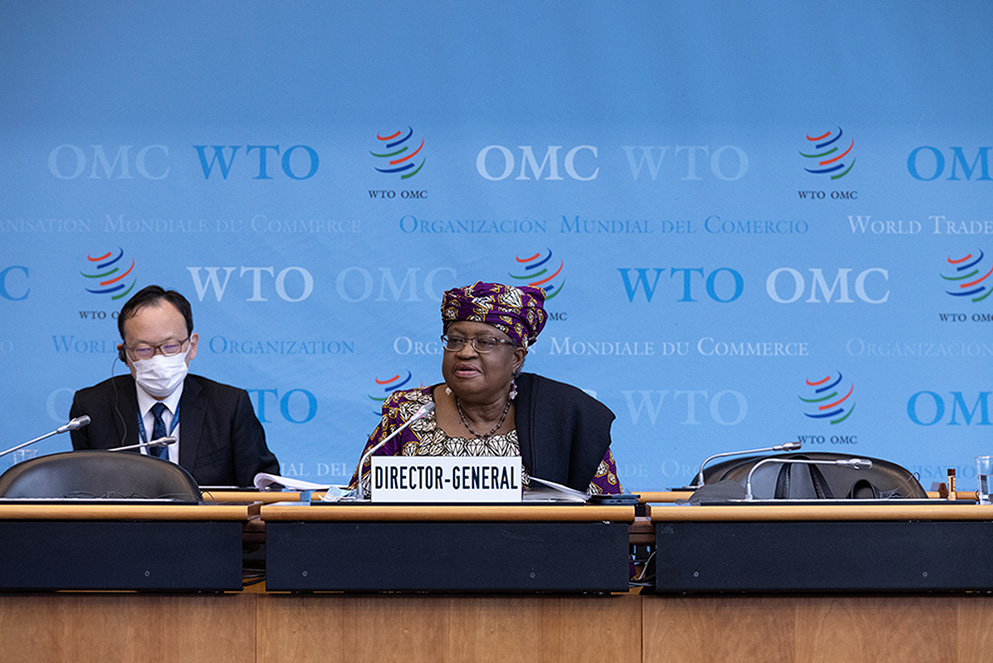SPEECHES — DG NGOZI OKONJO-IWEALA
More
I would like to take this opportunity to extend sympathies again to those of our members whose countries are experiencing an upsurge in COVID-19 cases at the moment — India, Brazil, Nepal, Sri Lanka, and others — and I'd like to thank other members who have also sought to help these countries under stress, which is the sign of solidarity that we seek to promote among our membership. The fact is that it shows we are all in it together. Let me just say that the way the WTO handles this matter is critical. We need to have a sense of urgency on how we approach this issue of response to COVID-19 because the world is watching. The issue of equitable access to vaccines, diagnostics and therapeutics is both the moral and economic issue of our time.
Vaccine policy is economic policy because the global economic recovery cannot be sustained unless we find a way to get equitable access to vaccines, therapeutics and diagnostics. Let me say that WTO members need to act on four fronts. We need to have a wholesome approach that some members have mentioned.
First, members should share their vaccines, those who have ordered more than they truly need should share with others, either through the COVAX facility or other mechanisms. Those who have raw materials should allow these to flow through supply chains so that all who can manufacture can take advantage of this. We should pay attention to the availability of skilled workers who can also help in the production of these commodities.
Second, we need to look at the issue of export restrictions and prohibitions and bureaucratic procedures and customs procedures that may confront supply chain mobility with respect to the manufacture of products to combat COVID-19. When we listened to manufacturers at the 14 April event that many members have referred to, it was clear that we need to be mindful to the issue of allowing supply chains to work. Otherwise, no matter what capacity we have we will still not be able to manufacture what is needed. I am happy to say that the number of export restrictions or prohibitions have come down from 109 to 51 but we need to keep it moving down.
Third, we need to work with manufacturers to enable them to mobilize existing capacity that is idle to manufacture. We heard from countries like Pakistan, Bangladesh, India, South Africa, and so on, Indonesia, Senegal, that there is some existing capacity that can be turned around in some months to be able to allow us to manufacture the kinds of doses we may need to go from the 5 billion doses produced in the world today to the 10.8 billion being forecast for this year to 15 billion, in particular if we need booster doses.
So we cannot act soon enough to put manufacturing capacity that is idle at work immediately and to invest in additional manufacturing capacity for the future. We also have to think of how to deal not just with this pandemic but of what role the WTO is going to play to ensure that we meet the needs of our members in a future pandemic or even the continuation of this one. Countries like Russia, China, Brazil, Cuba, who have vaccines under development or who are already sharing their vaccines with others, should look at ways to boost supplies so we can increase the volume of vaccines in the world. Those who need to get Emergency Use Authorization from the WHO to enable access to their vaccines should do so.
I'm happy to hear that the proponents of the TRIPS waiver are putting together a revised text. And I think that it is incumbent on us to move quickly to put the revised text on the table but also to begin and undertake text-based negotiations. I am firmly convinced that once we can sit down with an actual text in front of us, we shall find a pragmatic way forward, acceptable to all sides that allow the kinds of answers that our developing country members are looking at with respect to vaccines, whilst at the same time looking at research and innovation and how to protect them. We just need the will to sit down. Too many people are dying, as many members have already repeated with numbers. We need to treat this whole issue with a sense of urgency. On our part, we're following up on the workshop that we convened by trying to engage with manufacturers to see how we can work faster with them. We are also joining the Vaccine Manufacturers Task Force put together by CEPI, Gavi and the WHO.
Thank you all, and I want to thank all of you for trying to move us towards the conclusion on this issue.
Share
Share
 View Slideshow
View Slideshow
Problems viewing this page? If so, please contact [email protected] giving details of the operating system and web browser you are using.